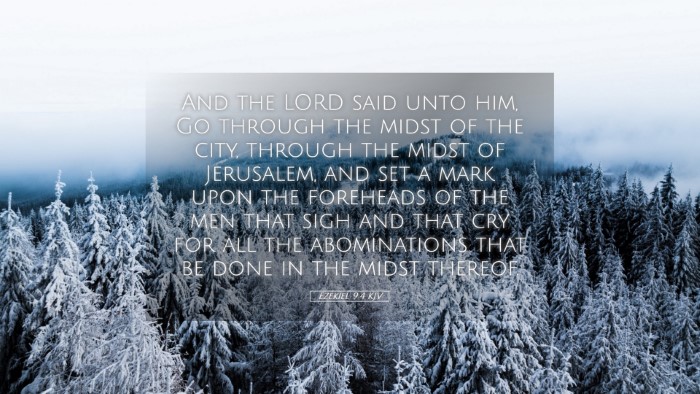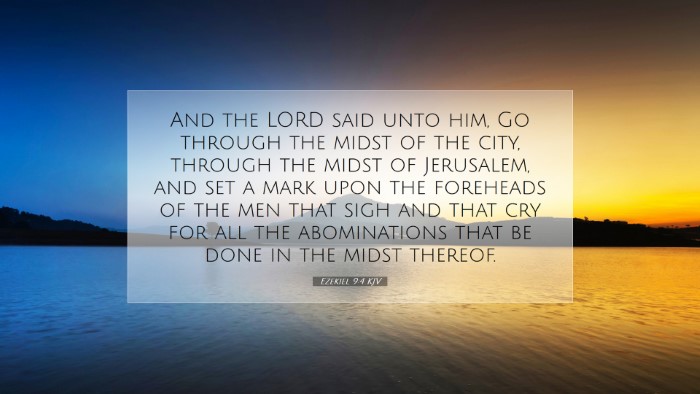Ezekiel 9:4 - Commentary Summary
Ezekiel 9:4 states, "And the LORD said unto him, Go through the midst of the city, through the midst of Jerusalem, and set a mark upon the foreheads of the men that sigh and that cry for all the abominations that be done in the midst thereof."
Contextual Analysis
This verse occurs in a prophetic vision that Ezekiel receives concerning the judgment of Jerusalem. The context involves a divine command for judgment against a city characterized by idolatry and social injustice.
The call to mark those who mourn over the sins of the city indicates a significant theme of God's mercy intertwined with judgment.
Commentary Insights
Matthew Henry's Commentary
Henry emphasizes the mercy shown to those who grieve for the sins of others. He notes that the "mark" signifies protection and favor from God amidst impending judgment. This provision for the faithful underlines God’s active concern for those who stand against the iniquities of their society.
Henry also interprets the act of marking as an act reflecting God's grace in preserving a remnant for Himself even in the direst times of moral decay.
Albert Barnes' Notes
Barnes presents a more detailed exploration of the implications of the "mark." He associates it with the idea of safety and acknowledges that it is alluding to a deeper spiritual insight: a divine distinction between the righteous and the wicked.
According to Barnes, the "sighing and crying" represent those who are both aware of the abominations around them and are actively distressed by them. It speaks to a heart condition that is responsive to both their own sins and the sins of the community.
Adam Clarke's Commentary
Clarke offers detailed historical insights, pointing out the cultural and spiritual context of Jerusalem at the time. He elaborates on the significance of the marking, citing that it denotes those individuals destined for preservation while others would face destruction.
He also refers to similar concepts found in Scripture, relating this marking to the sealing of the servants of God in Revelation. Clarke emphasizes that true lamentation over sin is a mark of sincerity in faith and indicates a divinely favored status.
Theological Implications
-
Divine Judgment and Mercy:
This verse exhibits a dual characteristic of God’s nature; His judgment is severe, yet He provides mercy for the repentant.
-
Human Response to Sin:
The passage calls believers to be aware and responsive to the moral failings around them, promoting an active stance against sin rather than a passive acceptance.
-
The Mark of the Righteous:
The “mark” symbolizes the assurance and security found in God's covenant, suggesting that true followers are visibly marked in a spiritual sense through their anguish over sin.
-
Community and Individual Responsibility:
The emphasis on “the men that sigh and that cry” highlights how communal sin impacts individuals but also that individuals can intercede for their community through godly sorrow.
Practical Applications
For pastors and church leaders, the call to watch over the congregation and discern those who grieve for sin is paramount. It forms the basis for pastoral care and guidance.
Students of theology can draw from this to engage deeper with the emotional and spiritual lives of believers, realizing that grief for sin is crucial for revival and restoration.
Theologians can reflect on the significance of divine marking as it relates to the broader biblical narrative of judgment and redemption, influencing their understanding of salvation history.
Conclusion
Ezekiel 9:4 serves as a reminder of the holiness of God in contrast to human wickedness and illustrates that genuine concern for sin is both a marking of the faithful and a precursor to divine mercy.
In light of the profound implications of this verse, believers are encouraged to cultivate a spirit that mourns over abominations, seeking not only personal holiness but also intercessory grace for their communities.


